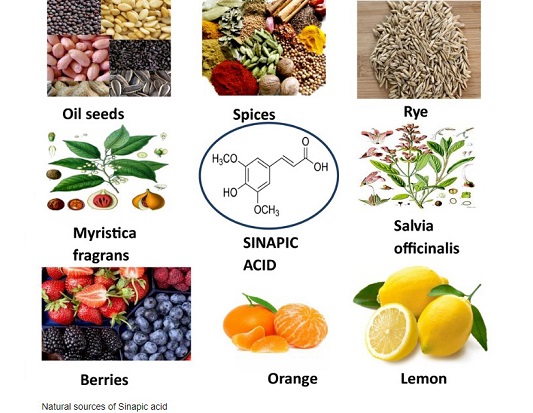Study Finds That Esters Of Sinapic Acid, A Cinnamic Derivative, Exhibits Antiviral Potential Against OC43 And SARS-CoV-2 Viruses
Kittisak Meepoon Fact checked by:Thailand Medical News Team Apr 26, 2024 1 year, 14 hours, 38 minutes ago
COVID-19 News: The ongoing COVID-19 pandemic has underscored the urgent need for effective antiviral therapies. While vaccines have played a crucial role in curbing the spread of the virus and reducing severe illness, the emergence of new variants with increased transmissibility and potential immune evasion highlights the importance of developing complementary antiviral drugs. Natural compounds have long been of interest in drug discovery due to their diverse biological activities and relatively low toxicity profiles. Among these compounds, flavonoids and derivatives of cinnamic acid have shown promise as potential antiviral agents.
 Esters Of Sinapic Acid, A Cinnamic Derivative, Exhibits Antiviral Potential Against OC43 And SARS-CoV-2 Viruses
Understanding Coronaviruses
Esters Of Sinapic Acid, A Cinnamic Derivative, Exhibits Antiviral Potential Against OC43 And SARS-CoV-2 Viruses
Understanding Coronaviruses
Coronaviruses (CoVs) belong to a family of enveloped, positive-sense single-stranded RNA viruses. They are classified into four genera: alphacoronavirus, betacoronavirus, gammacoronavirus, and deltacoronavirus. While some CoVs cause mild respiratory infections akin to the common cold, others such as SARS-CoV, SARS-CoV-2, and MERS-CoV can lead to severe respiratory distress and systemic complications. SARS-CoV-2, the causative agent of COVID-19, has rapidly spread worldwide, leading to significant morbidity and mortality.
Challenges in Antiviral Drug Development
The rapid mutation rate of RNA viruses like Coronaviruses poses a challenge to traditional drug development strategies. Variants with altered spike proteins can evade immune responses and potentially reduce the efficacy of vaccines and therapeutic antibodies. Therefore, there is a critical need for broad-spectrum antiviral agents that can target multiple strains of Coronaviruses while minimizing the risk of resistance development.
Exploring Natural Compounds as Antivirals
Natural compounds derived from plants have a long history of use in traditional medicine and modern drug discovery. Flavonoids, a class of polyphenolic compounds found in various fruits, vegetables, and medicinal plants, exhibit a wide range of biological activities, including antioxidant, anti-inflammatory, and antiviral properties. Quercetin, a flavonol abundant in foods like onions, apples, and berries, has attracted attention for its potential antiviral effects.
Cinnamic Acid Derivatives
Cinnamic acid and its derivatives have also been studied for their pharmacological properties. These compounds have demonstrated anti-inflammatory, antioxidant, and antiproliferative effects, making them promising candidates for therapeutic development. Sinapic acid, a derivative of cinnamic acid, has been associated with various health benefits, including its antioxidant and disease-modifying properties.
Methodology and Study Design
In a recent study conducted at the University of Cagliari that is covered in this
COVID-19 News report, researchers investigated the antiviral potential of esters
of cinnamic acids with quercetin against a panel of Coronaviruses, including OC43 and SARS-CoV-2. The esters were synthesized using established chemical methods and tested for cytotoxicity and antiviral activity in vitro.
Results and Findings
Among the synthesized esters, one derivative, the ester of sinapic acid (referred to as compound 7), exhibited significant antiviral activity against both OC43 and SARS-CoV-2 while demonstrating low cytotoxicity. This compound showed a promising EC50 profile, indicating its ability to inhibit viral replication at relatively low concentrations. Mechanistic studies suggested that compound 7 interfered with viral endocytosis by reducing viral attachment to host cells, thereby inhibiting viral entry and replication.
Discussion
The findings of this study highlight the potential of natural compounds, specifically esters of cinnamic acids with quercetin, as novel antiviral agents against Coronaviruses. Compound 7, in particular, emerged as a lead candidate due to its potent antiviral activity and favorable safety profile. The mechanism of action involving interference with viral attachment and entry provides valuable insights into its mode of action, paving the way for further research and development.
Implications for Drug Development
The discovery of compound 7 and its antiviral properties has significant implications for drug development efforts targeting Coronaviruses. By leveraging the unique chemical properties of natural compounds, researchers can potentially identify new classes of antiviral drugs with broad-spectrum activity and reduced risk of resistance development. Furthermore, compounds like quercetin and cinnamic acid derivatives offer the advantage of being derived from natural sources, making them attractive candidates for therapeutic interventions.
Future Directions
Further studies are warranted to elucidate the full therapeutic potential of esters of cinnamic acids with quercetin, including preclinical and clinical trials to assess efficacy and safety in humans. Additionally, exploring synergistic effects with existing antiviral drugs or other natural compounds could enhance their therapeutic benefits. The development of novel delivery systems to improve bioavailability and targeted delivery of these compounds may also enhance their clinical utility.
Conclusion
In conclusion, the study's findings underscore the promising antiviral potential of esters of cinnamic acids with quercetin against Coronaviruses. Compound 7, in particular, demonstrates significant activity against OC43 and SARS-CoV-2 while exhibiting low cytotoxicity. This research contributes to the ongoing efforts to identify effective antiviral therapies and highlights the importance of exploring natural compounds in drug discovery and development. Continued research in this area holds promise for combating current and future viral outbreaks effectively.
The study findings were published in the peer reviewed journal: Viruses.
https://www.mdpi.com/1999-4915/16/5/665
For the latest
COVID-19 News, keep on logging to Thailand Medical News.
Read Also:
https://www.thailandmedical.news/news/cinnamon-the-natural-remedy-for-flu-infections-and-beyond
https://www.thailandmedical.news/news/covid-19-herbs-study-finds-that-galangal-cinnamon-spice-mixture-blocks-coronavirus-infection-pathway-through-inhibition-of-sars-cov-2-mpro
https://www.thailandmedical.news/news/medical-news-italian-study-shows-that-cinnamaldehyde-from-cinnamon-is-an-effective-adjuvant-for-covid-19-prevention-and-treatment
https://www.thailandmedical.news/news/cinnamon-the-natural-remedy-for-flu-infections-and-beyond
https://www.thailandmedical.news/news/breaking-news-plant-based-compound-dicoumarol-emerges-as-promising-post-exposure-prophylactic-for-omicron-variant-of-sars-cov-2
https://www.thailandmedical.news/news/covid-19-herbs-german-american-study-shows-that-cinnamaldehyde-from-cinnamon-is-a-good-supplement-with-dexamethasone-for-treating-covid-19
https://www.thailandmedical.news/news/covid-19-news-canadian-study-shows-that-quercetin-not-ony-inhibits-sars-cov-2-but-it-also-prevents-syncytium-formation
https://www.thailandmedical.news/news/covid-19-news-mexican-scientists-recommend-quercetin-for-oxidative-stress-issues-in-long-covid
https://www.thailandmedical.news/news/quercetin-emerging-as-one-of-the-must-take-covid-19-supplements-especially-when-considering-the-omicron-variant-and-long-covid-19-issues
https://www.thailandmedical.news/news/covid-19-supplements-numerous-studies-show-that-the-phytochemical-quercetin-not-only-inhibits-sars-cov-2-but-helps-in-other-aspects-of-covid-19
https://www.thailandmedical.news/news/breaking-supplements-for-covid-19-quercetin-emerging-as-an-adjuvant-for-covid-19-treatments
